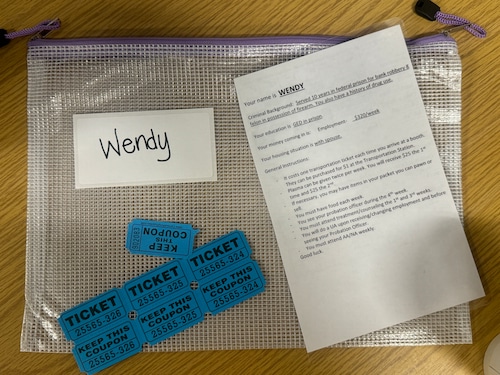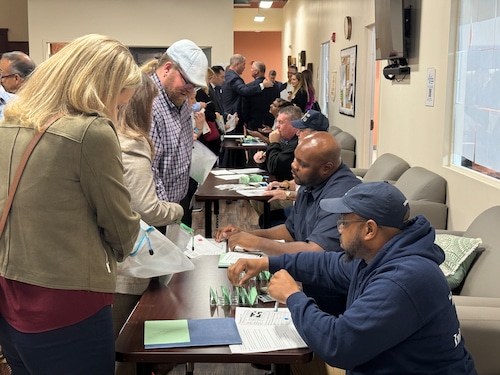A Massachusetts man has spent more of his life behind bars than outside of it.
During Henry “Hank” Houghton’s 40 years in prison, his entire family died, including his 12-year-old daughter, who was killed by a drunken driver.
But on Wednesday, Houghton focused on moving forward, dedicating his time as a free man to volunteering at an event that simulated the experiences of formerly incarcerated individuals.
Houghton was wrongly convicted of a child’s rape in Springfield in 1982. His case was overturned after he was exonerated by DNA evidence, and finally released on Dec. 31, 2021.
Now 74 years old, the West Brookfield man doesn’t hold any bitterness.
”Bitterness creates anger, anger creates violence and violence can create prison,” said Houghton on Wednesday afternoon. He sat in a beige leather chair at the Open Sky Community Compass Center in Worcester, where he volunteers to lead a stress support group every week.
”If you allow bitterness in your life, that’s going to control your life. I’m not going to allow that to happen.” Houghton spoke slow and clear. He wore wire-rimmed glasses, a Vietnam War Veteran hat and a white polo shirt.
Two curled small ribbons — one pink for Breast Cancer Awareness, the other purple for Domestic Violence Awareness — were pinned to his chest.
The simulation event Houghton was part of on Wednesday was designed to show state house representatives and parole board members the confusion and difficulty a formerly incarcerated person deals with in their return to society.
It was hosted by the state’s Executive Office of Public Safety and Open Sky, in conjunction with the Massachusetts Department of Corrections and ForHealth Consulting at UMass Chan Medical School.
A daunting future
When Houghton was released from prison, he had no certainty of his future until his lawyer introduced him to Open Sky — a lifeline that would change everything.
The human services organization has programs and assistance available to a wide variety of people, including those with acquired brain injuries, autism, are homeless or need behavioral or career aid.
For those currently in or returned from incarceration, who also have substance abuse, mental health disorders or other illnesses, Open Sky can help create a support plan.
The plan is designed to make sure the individual does not re-enter the justice system, which is called recidivism. People can get help to find housing, substance abuse treatment, obtain government ID and many other items necessary for a smoother transition.
During Wednesday’s event, Houghton sat as an Open Sky volunteer at one of more than a dozen tables in the room. Around him, participants shuffled from his table to others with tags like “ID; Church; Social Services; or Probation.” Each person clutched bags of simulated “personal documents” in hand.

The simulation packet from the incarceration reentry event in Worcester on Oct. 23. Photo by Irene RotondoIrene Rotondo
Fake nametags and purposefully confusing instructions were all participants had to fill out their documents. Simultaneously, they had to start “careers,” ensure “payments” were made for bills like rent and treatment — all without getting themselves “sent back to prison.”
One participant tried find full-time work before they made a visit to the career center, and were only allowed to take up a part-time position. Another participant didn’t have their birth certificate when they tried to get a government ID, and anyone who missed their rent was “put in jail.”
If any of it had happened in the real world, they would have been violating parole and could be sent back to prison.
Houghton’s mission
“Unfortunately, [incarceration] is a part of life for some people. But those people — me being one of them — we just have to do the best that we can go on with our life … and this is how I do it, with organizations like this,” Houghton said.
Besides his work at One Sky, Houghton regularly gives speeches to incoming students at UMass Chan Medical School about drug and alcohol abuse, crime and punishment, prison life and what he’s doing now.
He’s also involved at the Recovery Center of Hope in Wareham, a criminal justice organization in Springfield and is on the Parole Review for All committee in Watertown. He’s been asked to go back into prisons to mentor inmates.
While Houghton’s devotion doesn’t come from a place of anger, personal grief has a role in his mission.
Because of his daughter’s killing, Houghton does not drink. He also struggled with alcohol abuse as a Vietnam War veteran, prior to his imprisonment and her death.
He has made substance abuse awareness an integral part of his efforts to empower people criminally involved with the justice system — something that if they don’t understand, can wind them back up incarcerated, he said.
“While I was in the prison system, I heard so many different stories from so many different guys that were getting out… and were going to live positively. Then all of a sudden, I’d see some of them come back in on a parole violation or a new crime,” Houghton said.
“I would say, ‘Okay, what happened? They’d say, ‘Well, you know, Hank, you know, the booze and the drugs,’” he recalled.
“That’s not an excuse, that’s a failure. You have to be stronger than that struggle,” he said.
Returning to prison
The amount of returned citizens who re-offend and end up back in prison — like Houghton often saw before his release — has decreased in Massachusetts in recent years.
Former inmates who were released in 2019 were tracked in a three-year recidivism study performed annually by the Massachusetts Department of Corrections, which was released last week.
The study found the rate of recidivism has dropped by 3%, from 29% to 26%, for those who were released in 2019 versus those in 2018. There were a total of 1,947 inmates released in Massachusetts in 2019, with a little over 500 who returned to prison within three years.

Participants at the incarceration reentry simulation in Worcester on Oct. 23. Photo by Irene RotondoIrene Rotondo
This shows a positive trend, the study’s authors said. It highlighted recent efforts by state, like college educational programs and vocational training for incarcerated people, parole partnerships and women-focused mentoring.
But to Houghton and the state agencies, there’s still more efforts to be done.
“If someone’s hungry and they don’t know where they’re going sleep at night, they’re going to fail, right?” said Andrew Peck, Undersecretary of Criminal Justice, on Wednesday.
“They’re going to fail on supervisions, it will push them back into certain behaviors. If we can focus on those things initially, that’s where we set the foundation for success,” said Peck.
By bringing these issues to the attention of lawmakers through events like the simulation on Wednesday, he said, the state agencies hope to help further reduce recidivism through the potential of new legislation.
“…stepping into the shoes of a formerly incarcerated individual navigating reentry, participants gained invaluable insight into reentry challenges and the need for enhanced support systems. The simulation reminds us of the essential work we must continue to do in bridging the gap between release and reintegration,” said Terrence Reidy, Public Safety and Security Secretary, in a statement.
And while Houghton wholeheartedly believes in the successes of the simulation, he suggested further emphasis on family involvement in programs, and increased aid with housing in the current crisis.
He also said part of the solution is ending stigmas.
“I’m not the only one — there are a lot of ex-inmates who were exonerated or out on parole who try to eliminate the stigma [around their capabilities] because of what they’re doing now … people are doing good things out there,” Houghton said.
“It’s just a matter of the public and everybody opening their eyes to the reality of it,” he said.






